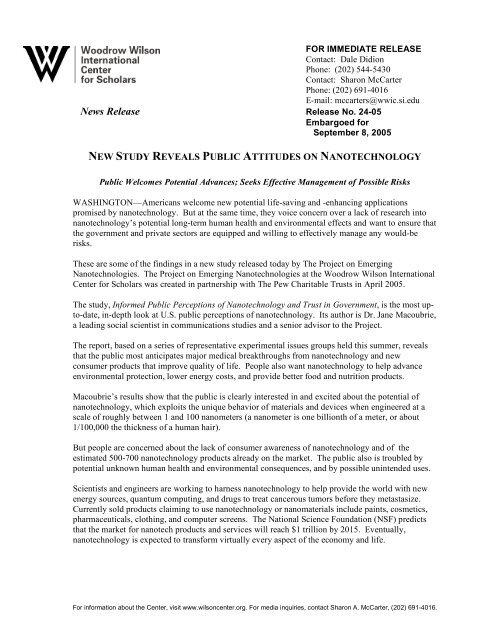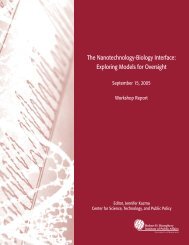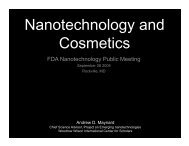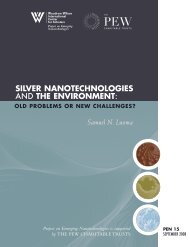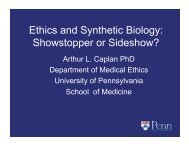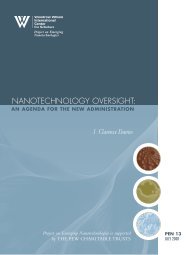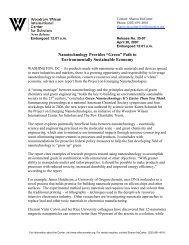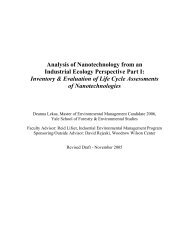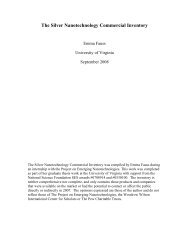News Release - Project on Emerging Nanotechnologies
News Release - Project on Emerging Nanotechnologies
News Release - Project on Emerging Nanotechnologies
Create successful ePaper yourself
Turn your PDF publications into a flip-book with our unique Google optimized e-Paper software.
-------------------------------- FOR IMMEDIATE RELEASE<br />
C<strong>on</strong>tact: Dale Didi<strong>on</strong><br />
Ph<strong>on</strong>e: (202) 544-5430<br />
Shar<strong>on</strong> A. McCarter<br />
C<strong>on</strong>tact: Shar<strong>on</strong> McCarter<br />
Ph<strong>on</strong>e: (202) 691-4016<br />
E-mail: mccarters@wwic.si.edu<br />
<str<strong>on</strong>g>News</str<strong>on</strong>g> <str<strong>on</strong>g>Release</str<strong>on</strong>g> <str<strong>on</strong>g>Release</str<strong>on</strong>g> No. 24-05<br />
Embargoed for<br />
September 8, 2005<br />
NEW STUDY REVEALS PUBLIC ATTITUDES ON NANOTECHNOLOGY<br />
Public Welcomes Potential Advances; Seeks Effective Management of Possible Risks<br />
WASHINGTON—Americans welcome new potential life-saving and -enhancing applicati<strong>on</strong>s<br />
promised by nanotechnology. But at the same time, they voice c<strong>on</strong>cern over a lack of research into<br />
nanotechnology’s potential l<strong>on</strong>g-term human health and envir<strong>on</strong>mental effects and want to ensure that<br />
the government and private sectors are equipped and willing to effectively manage any would-be<br />
risks.<br />
These are some of the findings in a new study released today by The <str<strong>on</strong>g>Project</str<strong>on</strong>g> <strong>on</strong> <strong>Emerging</strong><br />
<strong>Nanotechnologies</strong>. The <str<strong>on</strong>g>Project</str<strong>on</strong>g> <strong>on</strong> <strong>Emerging</strong> <strong>Nanotechnologies</strong> at the Woodrow Wils<strong>on</strong> Internati<strong>on</strong>al<br />
Center for Scholars was created in partnership with The Pew Charitable Trusts in April 2005.<br />
The study, Informed Public Percepti<strong>on</strong>s of Nanotechnology and Trust in Government, is the most upto-date,<br />
in-depth look at U.S. public percepti<strong>on</strong>s of nanotechnology. Its author is Dr. Jane Macoubrie,<br />
a leading social scientist in communicati<strong>on</strong>s studies and a senior advisor to the <str<strong>on</strong>g>Project</str<strong>on</strong>g>.<br />
The report, based <strong>on</strong> a series of representative experimental issues groups held this summer, reveals<br />
that the public most anticipates major medical breakthroughs from nanotechnology and new<br />
c<strong>on</strong>sumer products that improve quality of life. People also want nanotechnology to help advance<br />
envir<strong>on</strong>mental protecti<strong>on</strong>, lower energy costs, and provide better food and nutriti<strong>on</strong> products.<br />
Macoubrie’s results show that the public is clearly interested in and excited about the potential of<br />
nanotechnology, which exploits the unique behavior of materials and devices when engineered at a<br />
scale of roughly between 1 and 100 nanometers (a nanometer is <strong>on</strong>e billi<strong>on</strong>th of a meter, or about<br />
1/100,000 the thickness of a human hair).<br />
But people are c<strong>on</strong>cerned about the lack of c<strong>on</strong>sumer awareness of nanotechnology and of the<br />
estimated 500-700 nanotechnology products already <strong>on</strong> the market. The public also is troubled by<br />
potential unknown human health and envir<strong>on</strong>mental c<strong>on</strong>sequences, and by possible unintended uses.<br />
Scientists and engineers are working to harness nanotechnology to help provide the world with new<br />
energy sources, quantum computing, and drugs to treat cancerous tumors before they metastasize.<br />
Currently sold products claiming to use nanotechnology or nanomaterials include paints, cosmetics,<br />
pharmaceuticals, clothing, and computer screens. The Nati<strong>on</strong>al Science Foundati<strong>on</strong> (NSF) predicts<br />
that the market for nanotech products and services will reach $1 trilli<strong>on</strong> by 2015. Eventually,<br />
nanotechnology is expected to transform virtually every aspect of the ec<strong>on</strong>omy and life.<br />
For informati<strong>on</strong> about the Center, visit www.wils<strong>on</strong>center.org. For media inquiries, c<strong>on</strong>tact Shar<strong>on</strong> A. McCarter, (202) 691-4016.
The biggest hurdle may be c<strong>on</strong>vincing a skeptical public that oversight by government and industry<br />
will be swift, rigorous and independent of outside influences. Some resp<strong>on</strong>dents offered past<br />
examples of what they saw as “failed” oversight to support their belief that nano oversight might be<br />
less than what is needed.<br />
“Thorough pre-market product safety testing was a key way people wanted government and industry<br />
to act to improve trust,” Dr. Macoubrie said. “Numerous named examples ranging from Vioxx to<br />
dioxin have created a widespread percepti<strong>on</strong> that industry pushes new products to market without<br />
adequate safety testing, and people feel industry too often has put its own interests ahead of c<strong>on</strong>sumer<br />
safety.”<br />
A majority of study participants, 55 percent, say that government oversight bey<strong>on</strong>d voluntary<br />
standards is needed to manage any possible health and envir<strong>on</strong>mental risks. Only 11 percent feel<br />
voluntary standards, which have been a key part of government and industry discussi<strong>on</strong>s about<br />
nanotechnology oversight so far, would be adequate.<br />
Dr. Macoubrie also found that 76 percent of study participants believe that banning new<br />
nanotechnologies, as some n<strong>on</strong>governmental organizati<strong>on</strong>s (NGOs) have called for until more is<br />
known about the technology, is overreacting.<br />
“At this critical juncture, it is important that government, corporati<strong>on</strong>s, science and engineering<br />
leaders understand what the public wants and expects in terms of benefits from and oversight of<br />
nanotechnology,” said David Rejeski, director of the <str<strong>on</strong>g>Project</str<strong>on</strong>g> <strong>on</strong> <strong>Emerging</strong> <strong>Nanotechnologies</strong>.<br />
“If this industry is to grow to its promise of <strong>on</strong>e trilli<strong>on</strong> dollars by 2015, the federal government and<br />
industry need to put as much energy into building public trust as they do into developing new nano<br />
applicati<strong>on</strong>s,” said Rejeski. “In the end, the kinds of safety measures and disclosure the public wants<br />
make sense in terms of both l<strong>on</strong>g-term corporate strategy and good public policy.”<br />
The Woodrow Wils<strong>on</strong> Internati<strong>on</strong>al Center for Scholars is the country’s living, nati<strong>on</strong>al memorial<br />
to President Wils<strong>on</strong>. It was established by C<strong>on</strong>gress in 1968 and is headquartered in Washingt<strong>on</strong>,<br />
D.C. The center establishes and maintains a neutral forum for free, open and informed dialogue. It is<br />
a n<strong>on</strong>partisan instituti<strong>on</strong>, supported by public and private funds, and engaged in the study of nati<strong>on</strong>al<br />
and world affairs.<br />
The Pew Charitable Trusts serves the public interest by informing the public, advancing policy<br />
soluti<strong>on</strong>s and supporting civic life. The <str<strong>on</strong>g>Project</str<strong>on</strong>g> <strong>on</strong> <strong>Emerging</strong> <strong>Nanotechnologies</strong> joins two other<br />
Trust-supported science and technology policy projects—the Genetics and Public Policy Center at<br />
Johns Hopkins University and the Pew Initiative <strong>on</strong> Food and Biotechnology at the University of<br />
Richm<strong>on</strong>d.<br />
###<br />
For informati<strong>on</strong> about the Center, visit www.wils<strong>on</strong>center.org. For media inquiries, c<strong>on</strong>tact Shar<strong>on</strong> A. McCarter, (202) 691-4016.


